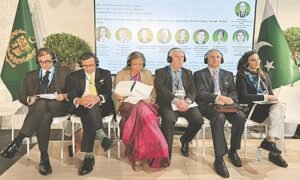 On Thursday, a significant panel discussion took place at the Pakistan Pavilion on the sidelines of the COP29 summit. The panel brought together leading voices from Pakistan’s climate sector, including government officials, climate experts, civil society representatives, and industry leaders, to discuss the nation’s ongoing challenges and advancements in climate resilience and sustainable development.
On Thursday, a significant panel discussion took place at the Pakistan Pavilion on the sidelines of the COP29 summit. The panel brought together leading voices from Pakistan’s climate sector, including government officials, climate experts, civil society representatives, and industry leaders, to discuss the nation’s ongoing challenges and advancements in climate resilience and sustainable development.
The session, titled ‘Judicial Pathways Towards Climate Justice: Judicial Approaches for Addressing Climate Change Through Global Analysis’ featured Supreme Court judges Syed Mansoor Ali Shah and Ayesha Malik, as well as Lahore High Court judge Jawwad Hassan and Senator Sherry Rehman, alongside other climate experts.
The session chaired by Justice Syed Mansoor Ali Shah, with remarks by a senior representative from the Ministry of Climate Change, who highlighted Pakistan’s pressing vulnerability to climate impacts, such as extreme weather events, glacial melting, and floods, all exacerbated by global warming. With a focus on the urgent need for climate finance and technology transfer, the official underscored Pakistan’s active commitment to reducing its carbon footprint despite contributing less than 1% to global greenhouse gas emissions.
One of the core topics of discussion was the implementation and scaling up of renewable energy projects, particularly solar and wind power, across Pakistan. Panelists stressed the importance of transitioning away from fossil fuels to mitigate carbon emissions and enhance energy security. A representative from the private sector showcased recent innovations in solar power projects in Sindh and Balochistan, emphasizing their potential to address energy poverty while reducing emissions.
The panel also explored climate adaptation measures being undertaken in agriculture, water management, and urban planning. A civil society leader presented success stories of community-based resilience projects, such as reforestation drives, sustainable farming practices, and water conservation initiatives in rural and flood-prone areas. They noted the significance of engaging local communities in decision-making processes and fostering public awareness to drive meaningful change.
In addition, the discussion highlighted the need for climate equity and justice on the global stage. Panelists urged wealthier nations to fulfill their commitments to climate finance and loss-and-damage support, which are vital for countries like Pakistan that bear a disproportionate share of climate risks. The importance of integrating gender-sensitive policies into climate action strategies was also emphasized, recognizing that women and marginalized groups are often the most affected by climate impacts.
The panel concluded with a call to action for international collaboration and a shared responsibility to tackle the climate crisis. Panelists expressed hope that platforms like COP29 would pave the way for tangible solutions and stronger partnerships, ensuring a sustainable and resilient future for all.
